What is a compound noun? Nouns are words that act as names of people, places, things, qualities, ideas, and actions. On the other hand, compound nouns are nouns made of two or more words, and they act as a single expression.
What is a compound noun?
A compound noun is a noun word made up of two or more words. For example, “computer keyboard” is a compound noun made up of the words “computer” and “keyboard.” To form a compound noun, you’ll put two separate words together.
Sometimes, you can do this by adding a word to the end of another word, like in the example above. Other times, you can do this by combining two words into one, as in the word “birthday,” which is made up of the words “birth” and “day.”
You can also create compound nouns by using a hyphen, as in the word “mother-in-law,” which is made up of the words “mother” and “in-law.”
Definition of a Compound Noun
A compound noun is described as “a noun that is comprised of two or even more separate words. Such as “toothpaste”, “French fries,” or “fireflies” by the Cambridge Dictionary. The Oxford Learners’ Dictionary has the same definition.
A compound noun is defined as “an adjective, verb, or noun composed of more than two words or portions of words, expressed into one word.” Compound nouns include dark-haired, travel agent, and washroom.”
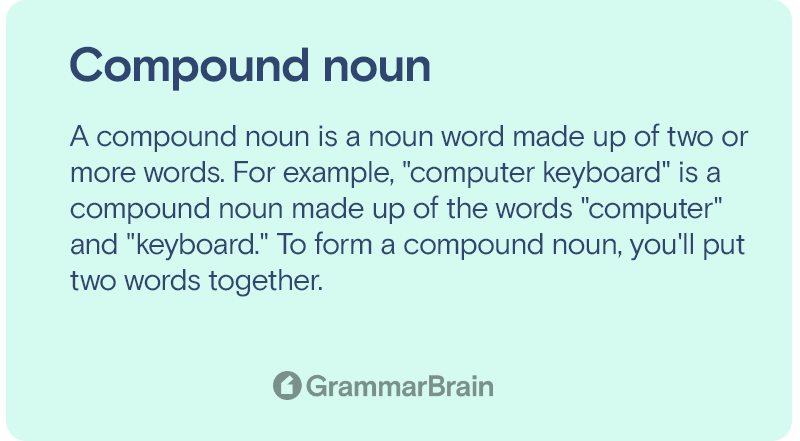
Most compound nouns follow these two structures:
- Noun + Noun
- Adjective + Noun
Verbs and prepositional phrases can also combine to form compound nouns.
Here are some examples of each type of compound noun:
Noun + Noun: Baseball, Dragonfly, Taxi-stand, Bookstore
Noun + Adjective: Town square, handful, truckful
Noun + Verb: Rainfall, haircut
Noun + Prepositional phrase: Mother-in-law, Gentleman-in-waiting
Verb + Noun: Swimsuit, Breakfast, Washing machine
Preposition + Noun: Upskill, Onlooker, Underground
Verb + Preposition: Check-out, Lookout, Go-between
Adjective + Noun: Black box, hot dog, full moon
As we can see, several combinations of words can lead to compound nouns. We use compound nouns in everyday speech and text knowingly or unknowingly.
Now, let’s see how to form sentences with them.
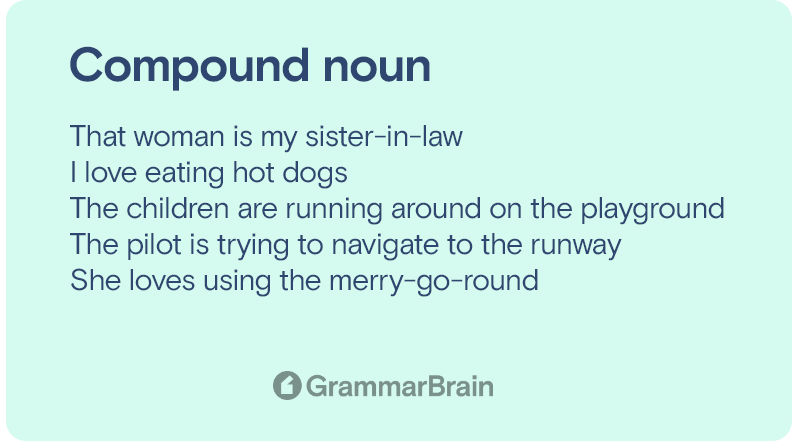
Sentences with compound nouns
Here are some sentences where we use compound nouns:
- That woman is my sister-in-law
- I love eating hot dogs
- The children are running around on the playground
- The pilot is trying to navigate to the runway
- She loves using the merry-go-round
- My favorite breakfast is peanut butter and jam
- Her computer’s keyboard isn’t working properly
- Greenhouse gas emission is a concern for the world
- The police are on the lookout for the criminal
Types of compound nouns
There are two ways of categorizing compound nouns. We already discussed the first way in the previous segment. Here we consider the structure of the compound noun, such as Noun + verb, Noun + Noun, adjective + Noun, and so on.
Another way of classifying compound nouns is by the number of words in the compound noun. Some compound nouns are single words, some are hyphenated words, and the remaining are disjointed words.
Single-word compound nouns are also known as closed compound nouns.
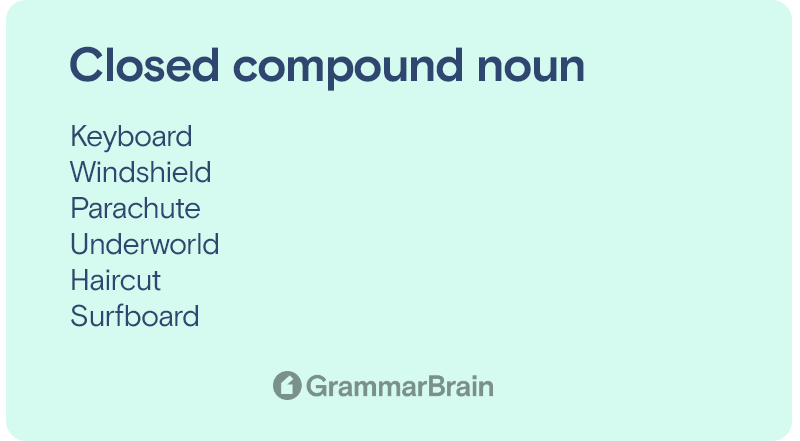
Closed compound nouns
When two words join without any hyphen or space to form a compound noun, we call it a closed compound noun. Here are some examples:
- Keyboard
- Windshield
- Parachute
- Underworld
- Haircut
- Surfboard
- Skateboard
- Whitepaper
These compound nouns include two words but without any spaces or hyphens.
Next, we have hyphenated compound nouns.
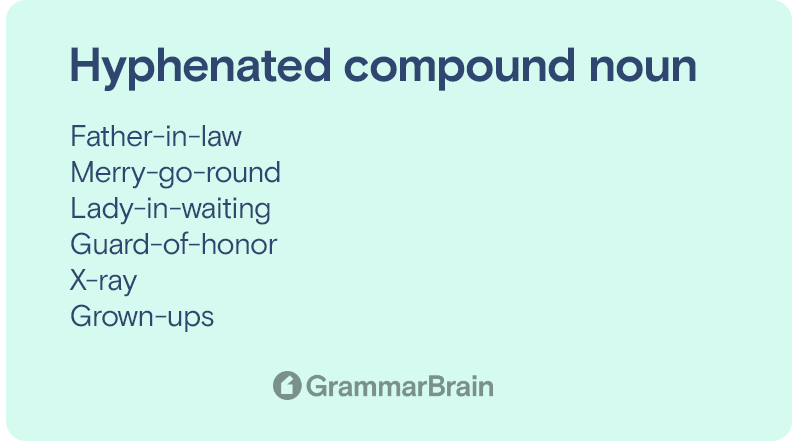
Hyphenated compound nouns
Many compound nouns are made of two or more hyphenated words. Here are some examples:
- Father-in-law
- Merry-go-round
- Lady-in-waiting
- Guard-of-honor
- X-ray
- Grown-ups
- Higher-ups
The next set of compound nouns is two words that act as single expressions. These are called open compound nouns.
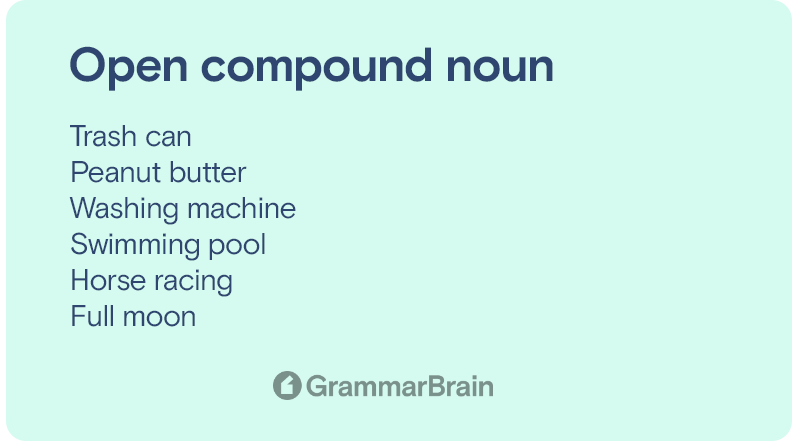
Open compound nouns
Open compound nouns are two distinct words, without any hyphen or space, that act as a single noun. Here are some examples:
- Trash can
- Peanut butter
- Washing machine
- Swimming pool
- Horse racing
- Full moon
- Bus stop
- Town square
- Tennis shoe
Open compound words can be difficult to identify. The trick is to see what role the words play in the sentence. Do they represent a single thing, idea, place, name, or person? If yes, then it’s an open compound noun. If not, it could be an adjective that modifies the Noun.
Compound nouns and compound adjectives look and sound similar in text and speech. However, their roles in language are different. For example, sky-blue is a compound adjective, while black box is a compound noun. The former represents a quality (color), while the latter represents an object.
When one comes across compound adjectives and compound nouns, all they have to do is look into their function in the sentence to tell the difference.
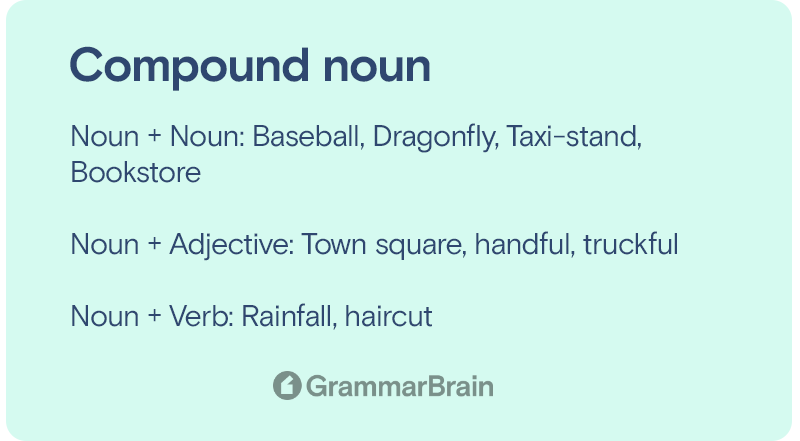
Forming a compound noun
There are four main ways to form compound nouns:
- Join two words with a hyphen, such as “mother-in-law” or “hand-held.”
- Join two words with a space, such as “real estate” or “full moon.”
- Join two words with an apostrophe, such as “don’t” or “can’t.”
- Join two words with no punctuation, such as “fireman” or “spokesperson.”
When forming compound nouns, it is important to choose the form that is most commonly used for the particular word combination.
Compound nouns vs noun paired with other words
Since many compound nouns follow the adjective/verb + noun or noun + adjective/verb structure, we can end up confusing compound nouns with nouns painted with another word.
Here’s an example to see how it works:
Both sentences have the word green house, one with space and one without space. In the first sentence, green house refers to the color of the house. In the second sentence, the closed compound noun greenhouse talks about a natural phenomenon.
Here’s another example:
- My brother was playing with a white ball
- The sport of white ball cricket is slowly fading away
In the first example, the adjective white describes the noun ball. In the second sentence, white ball refers to a type of ball used in the game of cricket.
Compound noun: singular and plural
Pluralizing compound nouns is tricky. Consider the word sister-in-law. When we pluralize it, the word becomes sisters-in-law, not sister-in-laws. But when we want to pluralize the term in-law, we in-laws.
Example:
- I am going to meet my in-laws
- I have two sisters-in-law
The general rule of pluralizing compound nouns is to pluralize the semantic head, or the part of the word that conveys the primary meaning. For example, we say footballs and feetball since the object that we are talking about is a ball, not feet.
However, there are a few exceptions to this rule, such as cupful/cupfuls, and teaspoonful/teaspoonfuls. According to modern dictionaries like Merriam-Webster, cupfuls is the correct term, not cupsful.
If confused about using the plural forms of compound nouns, the best option is to refer to a dictionary to see what the plural form looks like.
FAQs
What are the grammar rules that govern capitalizing compound nouns?
The first word of a compound noun is always capitalized, regardless of whether the word is a proper noun or not.
For example, “airport” is a compound of the common noun “air” and the proper noun “port,” but both words are capitalized. However, there are a few exceptions to this rule.
For instance, “e-mail” is always written in lowercase, as most words begin with a hyphen. In addition, compound nouns made up of two proper nouns are usually written in lowercase, as in “the United Nations.”
What is the difference between a compound noun and a complex noun phrase?
A compound noun is a noun that is made up of two or more words.
For example, the word “sunscreen” is a compound noun made up of the words “sun” and “screen.” A complex noun phrase, on the other hand, is a phrase that functions as a noun but is not made up of two or more words. Complex noun phrases can include verbs, adjectives, and adverbs.
For example, “the best way to get ahead” is a complex noun phrase. It includes the verb “get,” the adjective “best,” and the adverb “ahead.” At the same time, both compound nouns and complex noun phrases are used to modify or describe other words in a sentence.
Only complex noun phrases can stand alone as the subject or object of a sentence. As a result, understanding the difference between these two types of phrases is essential for accurate communication.
What are compound nouns?
Compound nouns are nouns made of two or more words that act as a single expression.
What are the types of compound nouns?
There are three types of compound nouns: open compound nouns, closed compound nouns, and hyphenated compound nouns.
What is the difference between open, closed, and hyphenated compound nouns?
Open compound nouns have two distinct words, e.g., golf cart, full moon, and peanut butter.
Closed compound nouns are used as single words, e.g., basketball, greenhouse, and windshield.
Hyphenated compound words have two or more words connected with a hyphen(s), e.g., sister-in-law, merry-go-round, and X-ray.
What are tips for using compound nouns correctly?
Here are a few other tips to keep in mind when using compound words:
- Pay attention to spelling: compound words are often spelled differently than their individual parts. For example, the word “ski” is spelled with an “i” but the word “skiing” is spelled with an “e.”
- Use hyphens when necessary: some compound words, such as “co-worker”, are written with a hyphen. However, others, such as “coworker”, do not require a hyphen. When in doubt, consult a dictionary.
- Be aware of grammar rules: in general, compounds formed from verbs and adjectives are written as one word (e.g., “dry cleaning”). At the same time, those formed from nouns and verbs are written as two words (e.g., “airplane tickets”).
How do you pronounce compound nouns?
Compound nouns tend to pure more stress on the first word. For example bathroom. Where “bath” has more stress (the first part of BATHroom). The elements in a compound noun are very diverse parts of speech.
Sources:
- Compound Nouns: All You Need to Know | Grammarly Blog
- Compound Nouns | Grammar | EnglishClub
- What is a Compound Noun? Examples & Exercises | Ginger (gingersoftware.com)
- What Is A Compound Noun? | Thesaurus.com
Inside this article
Fact checked:
Content is rigorously reviewed by a team of qualified and experienced fact checkers. Fact checkers review articles for factual accuracy, relevance, and timeliness. Learn more.
Core lessons
Glossary
- Abstract Noun
- Accusative Case
- Anecdote
- Antonym
- Active Sentence
- Adverb
- Adjective
- Allegory
- Alliteration
- Adjective Clause
- Adjective Phrase
- Ampersand
- Anastrophe
- Adverbial Clause
- Appositive Phrase
- Clause
- Compound Adjective
- Complex Sentence
- Compound Words
- Compound Predicate
- Common Noun
- Comparative Adjective
- Comparative and Superlative
- Compound Noun
- Compound Subject
- Compound Sentence
- Copular Verb
- Collective Noun
- Colloquialism
- Conciseness
- Consonance
- Conditional
- Concrete Noun
- Conjunction
- Conjugation
- Conditional Sentence
- Comma Splice
- Correlative Conjunction
- Coordinating Conjunction
- Coordinate Adjective
- Cumulative Adjective
- Dative Case
- Determiner
- Declarative Sentence
- Declarative Statement
- Direct Object Pronoun
- Direct Object
- Diction
- Diphthong
- Dangling Modifier
- Demonstrative Pronoun
- Demonstrative Adjective
- Direct Characterization
- Definite Article
- Doublespeak
- False Dilemma Fallacy
- Future Perfect Progressive
- Future Simple
- Future Perfect Continuous
- Future Perfect
- First Conditional
- Irregular Adjective
- Irregular Verb
- Imperative Sentence
- Indefinite Article
- Intransitive Verb
- Introductory Phrase
- Indefinite Pronoun
- Indirect Characterization
- Interrogative Sentence
- Intensive Pronoun
- Inanimate Object
- Indefinite Tense
- Infinitive Phrase
- Interjection
- Intensifier
- Infinitive
- Indicative Mood
- Participle
- Parallelism
- Prepositional Phrase
- Past Simple Tense
- Past Continuous Tense
- Past Perfect Tense
- Past Progressive Tense
- Present Simple Tense
- Present Perfect Tense
- Personal Pronoun
- Personification
- Persuasive Writing
- Parallel Structure
- Phrasal Verb
- Predicate Adjective
- Predicate Nominative
- Phonetic Language
- Plural Noun
- Punctuation
- Punctuation Marks
- Preposition
- Preposition of Place
- Parts of Speech
- Possessive Adjective
- Possessive Determiner
- Possessive Case
- Possessive Noun
- Proper Adjective
- Proper Noun
- Present Participle
- Prefix
- Predicate



